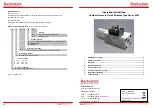
Reserved addresses excluded from IP multicast (IGMP) filtering
Traffic to IP multicast groups in the IP address range of 224.0.0.0 to 224.0.0.255 will always be flooded because
addresses in this range are "well known" or "reserved" addresses. Thus, if IP multicast is enabled, and there is an
IP multicast group within the reserved address range, traffic to that group will be flooded instead of filtered by the
switch.
NOTE:
In IP mode, non-reserved multicast IP addresses are not displayed as "reserved" addresses.
Multicast ARP support
To support IP multicasting, the multicast range of 01-00-5E-00-00-00 to 01-00-5E-7F-FF-FF is reserved for
Ethernet MAC addresses. The command
ip arp-mcast-replies
enables acceptance of the MAC addresses
in the IP multicast range.
Syntax:
[no] ip arp-mcast-replies
Enables acceptance of multicast MAC addresses in the IP multicast address range in ARP requests and replies.
Default: Disabled
Example:
Switch(config)# ip arp-mcast-replies
IGMPv3
The Internet Group Management Protocol (IGMP) is used by IPv4 systems (hosts and routers) to report their IP
multicast group membership to any neighboring multicast routers. This chapter is to describe version 3 of IGMP.
Version 1, specified in [RFC-1112], was the first widely-deployed version. Version 2, specified in [RFC-2236],
added support for “low leave latency”, that is, a reduction in the time it takes for a multicast router to learn that
there are no longer any members of a particular group present on an attached network. Version 3 adds support
for “source filtering”, that is, the ability for a system to report interest in receiving packets *only* from specified
source addresses, or from *all but* specified source addresses, sent to a particular multicast address. Version 3 is
Chapter 2 Multimedia traffic control with IP multicast (IGMP)
41
















































